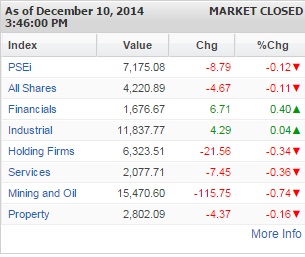PSEi continues to slip

The main-share Philippine Stock Exchange index lost 8.79 points or 0.12 percent to close at 7,175.08. But losses were pared down at the close after the index fell to as low as 7,133.69 in intra-day trade.
The index was weighed down by the holding firm, services, mining/oil and property counters while the financial and industrial index slightly firmed up.
Turnover amounted to P8.7 billion.
There were 64 advancers against 109 decliners while 52 stocks were unchanged.
Regional markets were affected by political uncertainties in Greece, where stocks suffered a bloodbath after the prime minister brought forward a parliamentary vote on a new head of state.
Locally, markets were cautious in the aftermath of Typhoon Ruby and ahead of a local monetary setting by the central bank.
“We continue to monitor damage assessment in the aftermath of the storm. If damage is minimal versus expectation, then it would lead to a hopeful market sentiment and consequently, bargain-hunting,” said local stock brokerage DA Market Securities.
The decline was led by AGI, which lost 2.42 percent while URC and DMCI shed over 1 percent. PLDT, the most actively traded company, also declined for the day alongside ALI, JG Summit, SMIC, Megaworld and Bloomberry.
Outside of PSEi stocks, retailer Puregold lost 2.85 percent.
On the other hand, EDC bucked the day’s downturn, gaining 1.73 percent, while SM Prime, AC, GTCapital, Jollibee and Metrobank also firmed up.
Outside of PSEi stocks, Xurpas continued to outperform, rising by 6.22 percent in relatively heavy volume while SSI also gained 1.45 percent. Nickel Asia was up by 0.72 percent.
“The PSEi fell through the resilient support at 7,200 and indicates a retest of next supports at 7,130 and 7,000 as RSI crosses below 50 (neutral) and as MAC/D (moving average convergence-divergence) shows a bearish crossover,” DA Market said.
“Along with selling pressure before and after the storm Ruby and as previously noted, possible discounted market placements and thinning holiday volumes can lead to opportunistic volatilities,” it said.